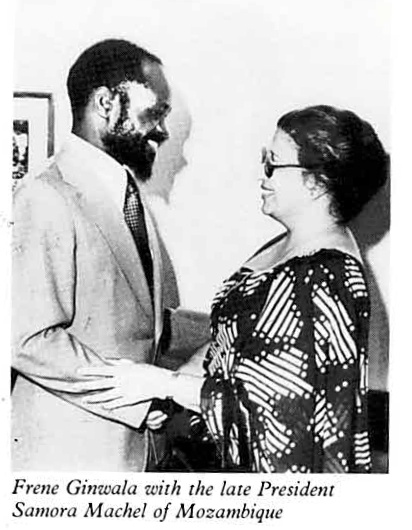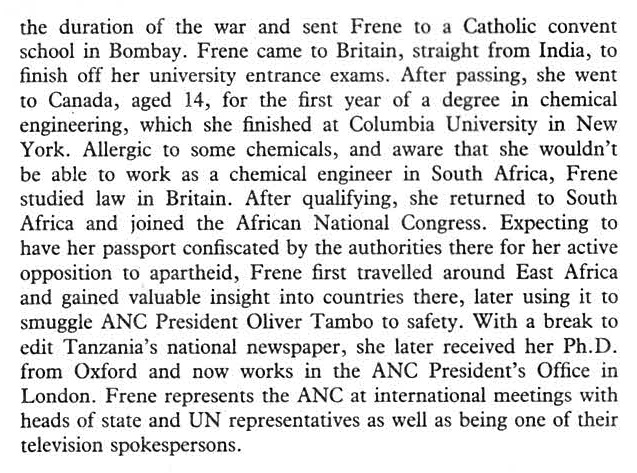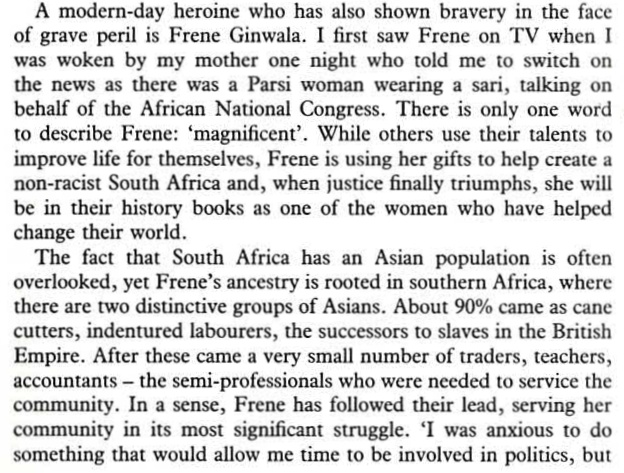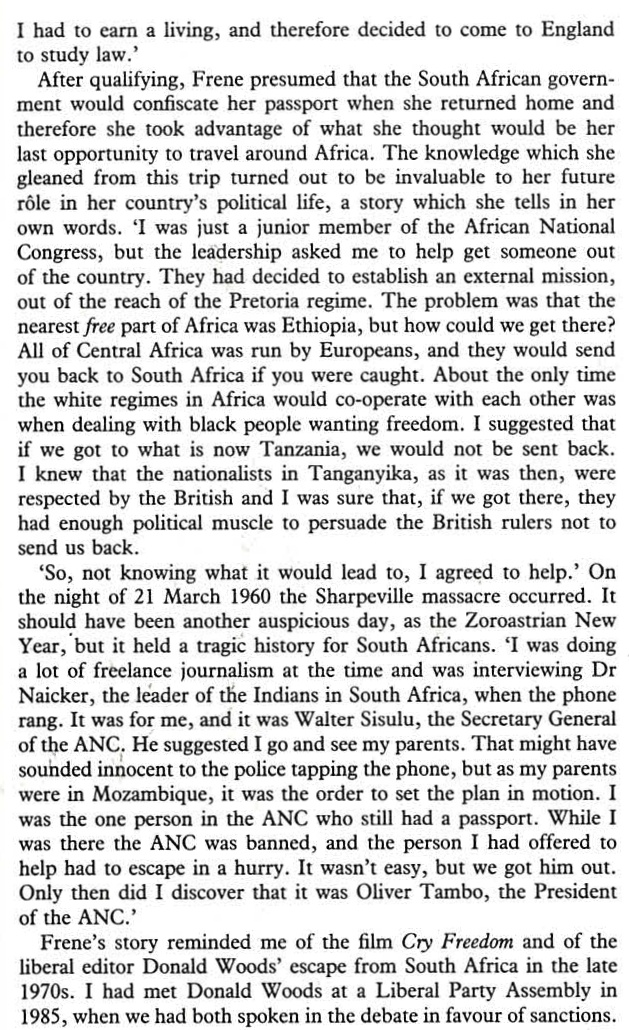Parsi Khabar is saddened to hear about the passing away of Frene Noshir Ginwala, a leading freedom fighter in South Africa, and the first speaker of an independent South Africa.
Our dear friend Zerbanoo Gifford, President of the World Zoroastrian Organization, knew Frene well; and shares her thoughts on Frene and her passing.

Frene Ginwalla was a great soul. Respected for her steadfastness to see the end of the barbaric apartheid regime that illegally ruled South Africa from 1948 to 1994. Frene was my heroine. Her death has left me numb. You believe that human rights warriors never die they live forever. In a funny way they do. Frene will live forever in the hearts of all those that fought the horrors of apartheid and those that endured those terrible years of vicious racism. Frene’s life was magnificent. She gave her whole self to fight the apartheid regime of South Africa and she finally won.
Hers was not an easy life although it could have been. Frene, could have lived comfortably. She was rich and as she was so fair that no one would have challenged her in racist South Africa. She could have passed as a Persian as they were classified as white by the Apartheid regime who at the time needed Persian oil to survive. Not Frene, who understood how racism devalues life and she decided to see the end of it. She never tried to pass off as white or anything else. She had the confidence to be her own woman.
Frene came from a wealthy and cultured Zoroastrian family. Her grandparents went to Africa as traders and prospered , owning the largest cotton gins in the southern hemisphere. During the Second World War Frene was holidaying in Bombay and so stayed there and was educated at a Catholic school. Later she went to Britain to sit her university exams. Brilliant, by the age of 14 she went to Canada to study chemical engineering. Allergic to some chemicals Frene could not work as a chemical engineer and so returned to Britain to study law. After qualifying she returned to South African and joined the ANC (African National Congress). Expecting to have her passport confiscated by the authorities there for her active opposition to apartheid, Frene left and travelled around Southern Africa gaining invaluable insight into countries there. Later she used her knowledge to smuggle ANC President Oliver Tambo to safety. With a break to edit Tanzania’s national newspaper , she later received her PHD from Oxford. Later she worked at the ANC President’s office in London. When Frene ,finally returned to her home in South Africa she made history by being the first woman speaker of their Parliament.
I first heard Frene when she was on BBC news in the early eighties. I had just become involved in British politics and had experienced the nastiness of racism first hand. In those days you never saw an Indian on TV. To think the present British Prime Minister is of Indian heritage would have been unthinkable.
My mother rang me and said turn the TV on, there is an Indian woman in a saree, and I think she is Parsi . Frene was certainly a Parsi in her whole being but not a practising Zoroastrian as she liked to tell me. Yet her Zoroastrian DNA was so evident to me. She was a fighter for others’ rights in the tradition of my heroes the Grand Old Man of India and Britian’s first Asian Member of Parliament Dadabhai Naoroji and the in dominatable Mrs Cama who fought for Indian Independence.
Frene, lived for many years in London and helped to lead the ANC outside South Africa. She inspired me to take up the fight against the apartheid regime in South Africa. Campaigning around universities and convincing people especially students not to have an account with any bank still operating in South Africa was just one of the many ways we tried to make people aware of how they could fight apartheid. We stood outside supermarkets boycotting South African goods especially fruits and wine. We asked that our Members of Parliament demanded the release of political prisoners such as Nelson Mandela and the need for full Mandatory sanctions against South Africa. This was a difficult task as the then Prime Minister of Britain was the formidable Mrs Thatcher who refused to support the struggle against the apartheid regime. She insisted that the Blacks, coloureds and Indians were fine, and that boycotting would disadvantage them. What a nonsense that was .I remember speaking at a political conference in Dundee in Scotland where( the marmalade and cakes are made) reminding the huge audience that the Blacks wanted us to boycott goods from South Africa to show the Afrikaans that the world had not forgotten their plight and were in solidarity with their sufferings. Blacks owned nothing and so did not care about the loss of money through sanctions. On that occasion, I was presented with a nasty telegram which in those days was how you messaged people. The telegram was sent by BOSS the South African secret police who said they were watching my moves and would get me. This just made me more determined to fight the detested Bully boys.
My campaigning work afforded me the extraordinary privilege to be chosen to speak at Trafalgar Square in Central London with Oliver Tambo and the then leader of the Labour party Lord Kinnock. We called for the release of Nelson Mandela. Then the apartheid campaigner Bishop Trevor Huddleston and I were chosen to present the” People’s Petition” to Mrs Thatcher at 10 Downing Street, calling for Full Mandatory Sanctions against South Africa and the release of Mandela. We all knew Mrs Thatcher would ignore the hundreds of thousands of signatures from people who wanted to see the end of Apartheid. But it was our way to show solidarity and let those suffering the obscenities of apartheid know that the majority of British people wished to see the end of it too.
Another day I shall never forget was when Frene rang me and told me to come quickly with my husband to her home in Islington. I never questioned her. We drove from Harrow the other side of London and the second I walked into her home I saw the figure of Govan Mbeki, father of the Thabo Mbeki the future President of South Africa. Few people knew Govan was in London. Govan Mbeki had spent 24 years as a prisoner on Robben island off Cape Town. I asked him how he survived the horrors of imprisonment on the notorious Robben Island. He explained that even blankets had been denied them. It was so cold at night, that they had to exercise for a couple of hours to be warm enough to sleep. He recalled that all they ate was porridge but on the 12th year of his incarceration he was given a slice of bread. I was in awe of his fortitude and wrote an article titled,” Man doesn’t live by bread alone.”
The last time I saw Frene was when my husband and I had been a guest of the then Prime Minister of Mauritius. It was a short flight to Johannesburg from Mauritius, and I wanted to see a project that the ASHA Foundation was working on at Bishop Trevor Huddleston centre which had helped transform young lives in modern South Africa. My youngest son who is a playwright and ASHA centre’s theatre director Adrian were training young Black actors to perform the history of South Africa for Mandela at his home. I rang Frene and she came to see us at our hotel. We had tea and updated each other on our projects and lives. Frene was frail then but still full of her unique strength of character.
I gave Frene a kiss and said, ” au revoir,” the French word to say Goodbye until we will meet again. I am sure I will meet Frene again if only in my memory which I shall always treasure. She was an extraordinary person who I greatly loved and admired.
Please read Pages from Zerbanoo ‘s first book “The Golden Thread , Asian Experiences in Post- Raj Britain” published by Harper Collins which mentions Frene Ginwalla who recently died in South Africa.




South Africa’s Indian-origin freedom fighter and winner of National Orders Frene Noshir Ginwala died at the age of 90. In a statement, President Cyril Ramaphosa confirmed that Ginwala left for her heavenly abode on Thursday evening. Ginwala had suffered a stroke a fortnight ago. She was a grandchild of one of the few Parsi families who belonged to India. She was sent to the UK for her studies by her parents before they settled in Mozambique, leaving South Africa.
After a ban was imposed on the ANC and the apartheid government arrested the High Command leaders in 1963, many ANC members, including Nelson Mandela, were helped by Ginwala.
Ginwala also helped in establishing ANC in exile in Tanzania. She became the first parliamentary speaker of South Africa after Mandela became president of the first democratically-elected government in 1994.
“On behalf of the nation and of the legislative, executive and judicial components of the State, (I offer my) sincere condolences to Dr Ginwala’s family, her nephews Cyrus, Sohrab and Zavareh, and their families,” said Ramaphosa.
Ginwala, born on April 25, 1932, participated in the anti-apartheid struggle and fought for democratic dispensation of South Africa as an academic, lawyer, activist, journalist and political leader.
“Frene Ginwala epitomised the ethos and expectations of our then fledgling Constitution and played an important role in building the capacity of Parliament through the transformation of activists and leaders into lawmakers who were, in turn, able to transform our country,” said Ramaphosa said.
“Beyond African shores, she positioned our young democracy both as one that had as much to contribute to as it had to learn from global precedents and experience,” he added.

Thanks for sharing all the details of Parsi rewind dishes.
Is it possible to have some of the recipes too?